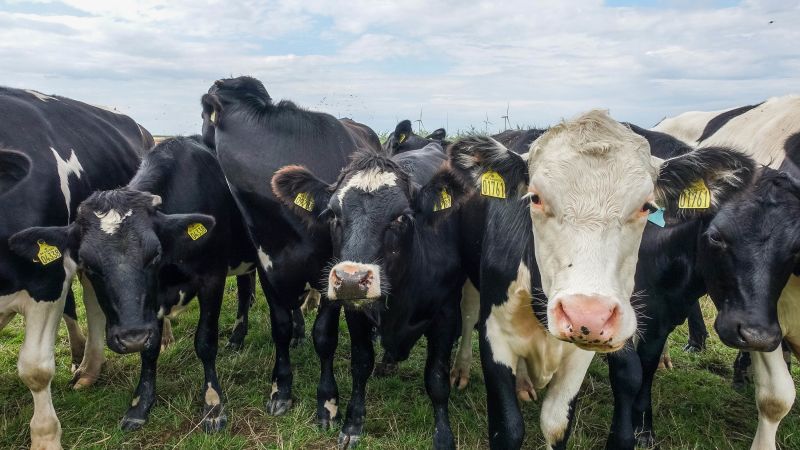
June 26, 2024 / 7:25 AM EDT/ AP
Denmark will tax livestock farmers for the greenhouse gases emitted by their cows, sheep and pigs from 2030, the first country in the world to do so as it targets a major source of methane emissions, one of the most potent gases contributing to global warming.
The aim is to reduce Danish greenhouse gas emissions by 70% from 1990 levels by 2030, said Taxation Minister Jeppe Bruus.
As of 2030, Danish livestock farmers will be taxed 300 kroner ($43) per ton of carbon dioxide equivalent in 2030. The tax will increase to 750 kroner ($108) by 2035. However, because of an income tax deduction of 60%, the actual cost per ton will start at 120 kroner ($17.3) and increase to 300 kroner by 2035. Although carbon dioxide typically gets more attention for its role in climate change, methane traps about 87 times more heat on a 20-year timescale, according to the U.S. National Oceanic and Atmospheric Administration.
Levels of methane, which is emitted from sources including landfills, oil and natural gas systems and livestock, have increased particularly quickly since 2020. Livestock account for about 32% of human-caused methane emissions, says the U.N. Environment Program.
“We will take a big step closer in becoming climate neutral in 2045,” Bruus said, adding Denmark “will be the first country in the world to introduce a real CO2 tax on agriculture” and hopes other countries follow suit.
New Zealand had passed a similar law due to take effect in 2025. However, the legislation was removed from the statute book on Wednesday after hefty criticism from farmers and a change of government at the 2023 election from a center-left ruling bloc to a center-right one. New Zealand said it would exclude agriculture from its emissions trading scheme in favor of exploring other ways to reduce methane.
In Denmark, the deal was reached late Monday between the center-right government and representatives of farmers, the industry and unions, among others, and presented Tuesday.
Denmark’s move comes after months of protests by farmers across Europe against climate change mitigation measures and regulations they say are driving them to bankruptcy.
The Danish Society for Nature Conservation, the largest nature conservation and environmental organization in Denmark, described the tax agreement as “ a historic compromise.”
“We have succeeded in landing a compromise on a CO2 tax, which lays the groundwork for a restructured food industry -- also on the other side of 2030,” its head, Maria Reumert Gjerding, said after the talks in which they took part.
A typical Danish cow produces 6 metric tons (6.6 tons) of CO2 equivalent per year. Denmark, which is a large dairy and pork exporter, also will tax pigs, although cows produce far higher emissions than pigs.
The tax has to be approved in the 179-seat Folketing, or parliament, but the bill is expected to pass after the broad-based consensus.
According to Statistic Denmark, there were as of June 30, 2022, 1,484,377 cows in the Scandinavian country, a slight drop compared to the previous year.
In: Climate Change methane Global warming Denmark





